
Hendrik Frensch Verwoerd was a South African politician, a scholar of applied psychology and sociology, and chief editor of Die Transvaler newspaper. He is commonly regarded as the architect of Apartheid. Verwoerd played a significant role in socially engineering apartheid, the country's system of institutionalized racial segregation and white supremacy, and implementing its policies as Minister of Native Affairs (1950–1958) and then as prime minister (1958–1966). Furthermore, Verwoerd played a vital role in helping the far-right National Party come to power in 1948, serving as their political strategist and propagandist, becoming party leader upon his premiership. He was the Union of South Africa's last prime minister, from 1958 to 1961, when he proclaimed the founding of the Republic of South Africa, remaining its prime minister until his assassination in 1966.
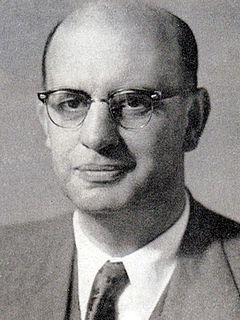
Pieter Willem Botha,, commonly known as P. W. and Afrikaans: Die Groot Krokodil, was a South African politician. He served as the last prime minister of South Africa from 1978 to 1984 and the first executive state president of South Africa from 1984 to 1989.

The National Party, also known as the Nationalist Party, was a political party in South Africa founded in 1914 and disbanded in 1997. The party was an Afrikaner ethnic nationalist party that promoted Afrikaner interests in South Africa. However, in 1990 it became a South African civic nationalist party seeking to represent all South Africans. It first became the governing party of the country in 1924. It was an opposition party during World War II but it returned to power and was again in the government from 4 June 1948 until 9 May 1994.

Balthazar Johannes "B. J." Vorster was a South African politician who served as the prime minister of South Africa from 1966 to 1978 and the fourth state president of South Africa from 1978 to 1979. Known as B. J. Vorster during much of his career, he came to prefer the anglicized name John in the 1970s.

Wilbur Addison Smith was a Zambian-born British-South African novelist specialising in historical fiction about international involvement in Southern Africa across four centuries, seen from the viewpoints of both black and white families.

Helen Suzman, OMSG, DBE was a South African anti-apartheid activist and politician. She represented a series of liberal and centre-left opposition parties during her 36-year tenure in the whites-only, National Party-controlled House of Assembly of South Africa at the height of apartheid.
Events from the year 1962 in South Africa. This year is notable for its internal and international resistance campaigns against the country's Apartheid legislation. Umkhonto we Sizwe, the militant wing of the African National Congress, made its first sabotage attacks in 1961, and Nelson Mandela traveled to Ethiopia to rally support for Umkhonto and justify the attacks. Nelson Mandela was sentenced to jail for 5 years upon returning to South Africa for illegally leaving the country. The international sporting community also showed its displeasure with the government's laws. FIFA suspended South Africa in 1962 for fielding an exclusively-white South African national football team, forcing South African football authorities to add black players to the team. The government, in turn strengthened methods of enforcing Apartheid, and the Robben Island prison was made a political prison in 1962.

A referendum on becoming a republic was held in South Africa on 5 October 1960. The Afrikaner-dominated right-wing National Party, which had come to power in 1948, was avowedly republican, and regarded the position of Queen Elizabeth II as head of state as a relic of British imperialism. The National Party government subsequently organised the referendum on whether the then Union of South Africa should become a republic. The vote, which was restricted to whites – the first such national election in the union – was narrowly approved by 52.29% of the voters. The Republic of South Africa was constituted on 31 May 1961.

Apartheid was a system of institutionalised racial segregation that existed in South Africa and South West Africa from 1948 until the early 1990s. Apartheid was characterized by an authoritarian political culture based on baasskap, which ensured that South Africa was dominated politically, socially, and economically by the nation's minority white population. According to this system of social stratification, white citizens had the highest status, followed by Indians and Coloureds, then black Africans. The economic legacy and social effects of apartheid continue to the present day.
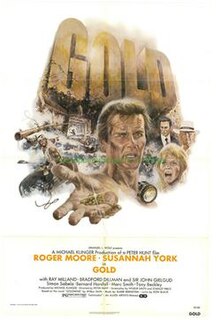
Gold is a 1974 British thriller film starring Roger Moore and Susannah York and directed by Peter R. Hunt. It was based on the 1970 novel Gold Mine by Wilbur Smith. Moore plays Rodney "Rod" Slater, general manager of a South African gold mine, who is instructed by his boss Steyner to break through an underground dike into what he is told is a rich seam of gold. Meanwhile, he falls in love with Steyner's wife Terry, played by York. In the United States, the film was only released as part of a double bill.

Amandla!: A Revolution in Four-Part Harmony is a 2002 documentary film depicting the struggles of black South Africans against the injustices of Apartheid through the use of music. The film takes its name from the Zulu and Xhosa word amandla, which means power.

When the Lion Feeds (1964) is the debut novel of Rhodesian writer Wilbur Smith. It introduces the Courtney family, whose adventures Smith would tell in many subsequent novels. In 2012, Smith said the novel remained his favourite because it was his first to be published.

Nelson Rolihlahla Mandela was a South African anti-apartheid revolutionary and political leader who served as the first president of South Africa from 1994 to 1999. He was the country's first black head of state and the first elected in a fully representative democratic election. His government focused on dismantling the legacy of apartheid by tackling institutionalised racism and fostering racial reconciliation. Ideologically an African nationalist and socialist, he served as the president of the African National Congress (ANC) party from 1991 to 1997.
The Courtney Novels are a series of seventeen novels published between 1964 and 2019 by Wilbur Smith. They chronicle the lives of the Courtney family, from the 1660s through until 1987. The novels can be split into three parts; the original trilogy of novels follow the twins Sean and Garrick Courtney from the 1860s until 1925. The second part is five books which follows Centaine de Thiry Courtney, her sons and grandchildren between 1917 and 1987. The third part, the most recently written, follows the Courtney family from the 1660s through until 1939, focusing on successive generations of the family. There are also two books that follow the third series. As well, there are three additional Courtney books.

Melanie Verwoerdpronounced [fɛr'vurt](18 April 1967, in Pretoria) is a South African political analyst. She was previously a politician, ambassador, and the director of UNICEF Ireland.
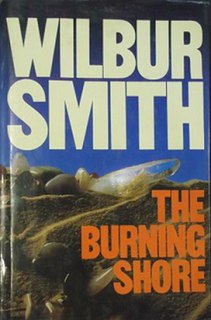
The Burning Shore is a novel by Wilbur Smith set during and after World War I.
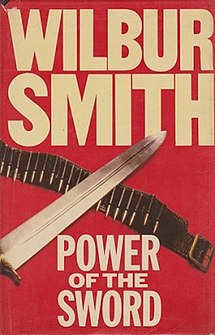
Power of the Sword (1986) is a novel by Wilbur Smith set before and during World War II.
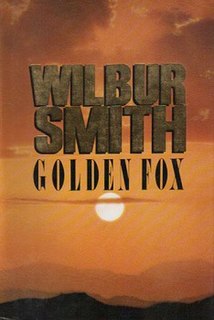
Golden Fox is a novel by Wilbur Smith, one of the Courtney Novels. It is set from 1969 to 1979 and touches on the South African Border War and the revolution in Ethiopia.

The apartheid regime in South Africa began in 1948 and lasted until 1994. It involved a system of institutionalized racial segregation and white supremacy, and placed all political power in the hands of a white minority. Opposition to apartheid manifested in a variety of ways, including boycotts, non-violent protests, and armed resistance. Music played a large role in the movement against apartheid within South Africa, as well as in international opposition to apartheid. The impacts of songs opposing apartheid included raising awareness, generating support for the movement against apartheid, building unity within this movement, and "presenting an alternative vision of culture in a future democratic South Africa."
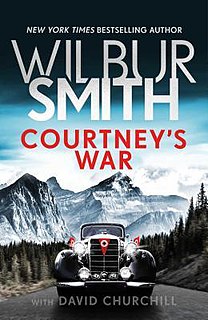
Courtney's War is a 2018 novel by Wilbur Smith and David Churchill.


















